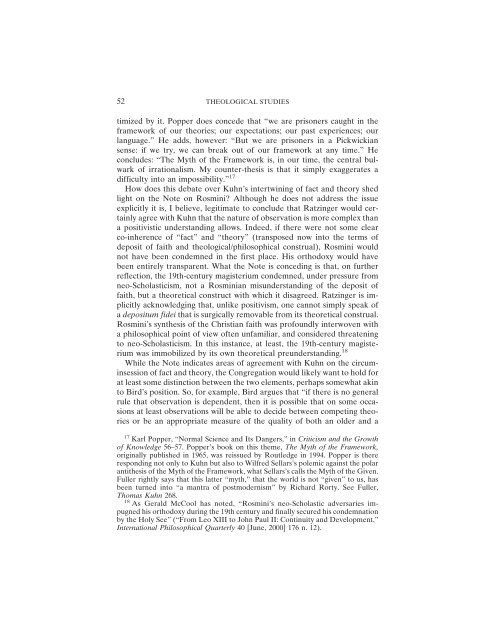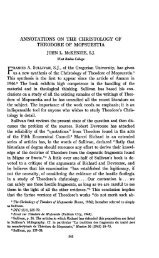rosmini, ratzinger, and kuhn - Theological Studies
rosmini, ratzinger, and kuhn - Theological Studies
rosmini, ratzinger, and kuhn - Theological Studies
You also want an ePaper? Increase the reach of your titles
YUMPU automatically turns print PDFs into web optimized ePapers that Google loves.
52 THEOLOGICAL STUDIES<br />
timized by it. Popper does concede that “we are prisoners caught in the<br />
framework of our theories; our expectations; our past experiences; our<br />
language.” He adds, however: “But we are prisoners in a Pickwickian<br />
sense: if we try, we can break out of our framework at any time.” He<br />
concludes: “The Myth of the Framework is, in our time, the central bulwark<br />
of irrationalism. My counter-thesis is that it simply exaggerates a<br />
difficulty into an impossibility.” 17<br />
How does this debate over Kuhn’s intertwining of fact <strong>and</strong> theory shed<br />
light on the Note on Rosmini? Although he does not address the issue<br />
explicitly it is, I believe, legitimate to conclude that Ratzinger would certainly<br />
agree with Kuhn that the nature of observation is more complex than<br />
a positivistic underst<strong>and</strong>ing allows. Indeed, if there were not some clear<br />
co-inherence of “fact” <strong>and</strong> “theory” (transposed now into the terms of<br />
deposit of faith <strong>and</strong> theological/philosophical construal), Rosmini would<br />
not have been condemned in the first place. His orthodoxy would have<br />
been entirely transparent. What the Note is conceding is that, on further<br />
reflection, the 19th-century magisterium condemned, under pressure from<br />
neo-Scholasticism, not a Rosminian misunderst<strong>and</strong>ing of the deposit of<br />
faith, but a theoretical construct with which it disagreed. Ratzinger is implicitly<br />
acknowledging that, unlike positivism, one cannot simply speak of<br />
a depositum fidei that is surgically removable from its theoretical construal.<br />
Rosmini’s synthesis of the Christian faith was profoundly interwoven with<br />
a philosophical point of view often unfamiliar, <strong>and</strong> considered threatening<br />
to neo-Scholasticism. In this instance, at least, the 19th-century magisterium<br />
was immobilized by its own theoretical preunderst<strong>and</strong>ing. 18<br />
While the Note indicates areas of agreement with Kuhn on the circuminsession<br />
of fact <strong>and</strong> theory, the Congregation would likely want to hold for<br />
at least some distinction between the two elements, perhaps somewhat akin<br />
to Bird’s position. So, for example, Bird argues that “if there is no general<br />
rule that observation is dependent, then it is possible that on some occasions<br />
at least observations will be able to decide between competing theories<br />
or be an appropriate measure of the quality of both an older <strong>and</strong> a<br />
17 Karl Popper, “Normal Science <strong>and</strong> Its Dangers,” in Criticism <strong>and</strong> the Growth<br />
of Knowledge 56–57. Popper’s book on this theme, The Myth of the Framework,<br />
originally published in 1965, was reissued by Routledge in 1994. Popper is there<br />
responding not only to Kuhn but also to Wilfred Sellars’s polemic against the polar<br />
antithesis of the Myth of the Framework, what Sellars’s calls the Myth of the Given.<br />
Fuller rightly says that this latter “myth,” that the world is not “given” to us, has<br />
been turned into “a mantra of postmodernism” by Richard Rorty. See Fuller,<br />
Thomas Kuhn 268.<br />
18 As Gerald McCool has noted, “Rosmini’s neo-Scholastic adversaries impugned<br />
his orthodoxy during the 19th century <strong>and</strong> finally secured his condemnation<br />
by the Holy See” (“From Leo XIII to John Paul II: Continuity <strong>and</strong> Development,”<br />
International Philosophical Quarterly 40 [June, 2000] 176 n. 12).

















